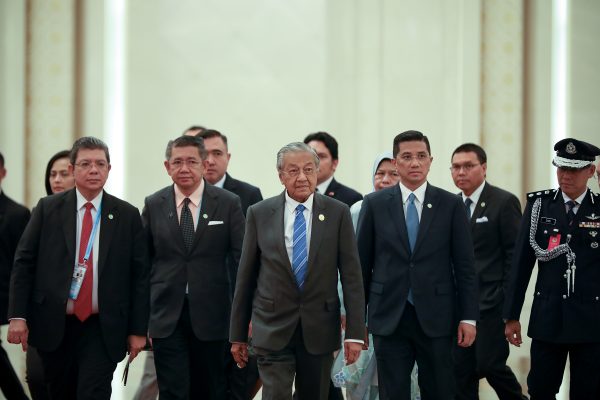But one year after taking control of government, Pakatan appears to be re-instituting the practice of selective patronage, with government-linked companies (GLCs) as its key instrument.
GLCs are a complex ensemble of statutory bodies, foundations, trust agencies, investment enterprises and a sovereign wealth fund. These institutions, controlled by the central and 13 state governments in the Malaysian federation, officially function primarily as ’enablers’ of domestic firms, to nurture a dynamic privately-owned enterprise base.
But at the state level, different public institutions own GLCs through the states’ chief ministers and use them in specific constituencies to mobilise electoral support. Party members are liberally appointed as directors of these GLCs and use their stipends for political activities.
This GLC framework became entrenched in the economy as well as the political system during Mahathir’s long 22-year reign as prime minister, from 1981 until 2003. By the time of GE14, the GLC structure had become so huge — and so abused by the preceding Barisan Nasional government — that Mahathir described it as a ‘monster’.
Despite Pakatan’s promise of a new approach to shaping Malaysia’s political economy, experience thus far suggests a surprising degree of continuity. Rather than give up an appealingly effective lever for consolidating power, Pakatan leaders seem inclined to borrow the same tools that Barisan had so detrimentally relied on.
Shortly after the election, the newly-minted Ministry of Economic Affairs (MEA) took control of numerous GLCs from the Ministry of Finance (MoF). In this discreet shuffling of GLCs between ministries, Malaysia’s only sovereign wealth fund, Khazanah Nasional, was channelled from MoF to Mahathir’s control in the Prime Minister’s Department.
Under Barisan, the Prime Minister had also functioned as the Finance Minister, a practice Mahathir had started in 2001 — but Pakatan, while in opposition, had pledged to ensure the same politician would not hold both portfolios. The government did not explain why these GLCs were shifted between ministries, but MoF’s enormous influence over the corporate sector has been significantly diminished.
Then, another contentious issue occurred. Minister of Rural and Regional Development, Rina Harun, of Mahathir’s Parti Pribumi Bersatu Malaysia (Bersatu), appointed politicians from her party to the boards of directors of GLCs under her control.
Under United Malays National Organisation (UMNO), this ministry was persistently embroiled in allegations of corruption, undermining the activities of its GLCs that had been created to redress spatial inequalities and reduce poverty. This ministry is so important in mobilising electoral support that it was always placed under the control of a senior UMNO leader.
The minister’s directorial appointments suggest a worrying trend of continuing the old regime’s irresponsible practices.
The current state of play raises an important question about an interesting phenomenon: what happens, in terms of dismantling rent-seeking and patronage and instituting reforms to curb corruption, when a new regime comprises politicians who see this framework as a mechanism to consolidate power?
A link between two core issues remains in place after regime change: elite domination and the continued practice of selective patronage, legitimised by advocating race-based policies that are to be implemented through GLCs. Elite domination was obvious under UMNO, with Barisan component members subservient to then-prime minister Najib Razak. In Pakatan, a multi-party coalition, Prime Minister Mahathir and economic advisor Daim Zainuddin appear to have disproportionate influence when it comes to decision-making on core issues, though the parameters of their power remain unclear.
Elite domination of the economy at the state level also remains. GLCs have persistently been used to distribute different types of rents such as financial aid, contracts, permits and licences to party members in key constituencies. Even with regime change, the presence of covert networks of power created through GLCs in these states is unlikely to be reformed, contributing to continued serious wastage of scarce resources.
The diversity in political–business ties, where government institutions figure, is an indication of how complex the GLC problem has become. And, since there is little public knowledge of GLCs, the opacity of these enterprises has allowed for their abuse by politicians.
Ironically, it was these forms of unproductive government–business networks that Pakatan had promised to dismantle when in opposition, in order to forge a ‘New Malaysia’. This New Malaysia was supposed to be devoid of race-based political discourses and policies, with the GLCs deployed to promote equitable development and redress social inequities.
The GLCs were not to be led by politicians who have no clue how to utilise them productively in the economy.
Evidently, consolidating power is more important for Malaysia’s new political elites than restructuring an economy in dire need of reform.
Edmund Terence Gomez is Professor of Political Economy at the Faculty of Economics & Administration, University of Malaya.
An earlier version of this piece appeared here in New Mandala.

